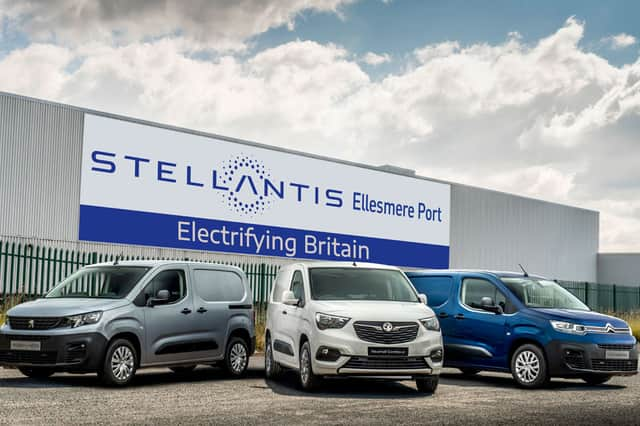UK and European car makers join Vauxhall owner’s calls to scrap Brexit trade deal


Car makers from across the UK and Europe have joined calls to delay or renegotiate a trade deal which could cause massive damage to the UK car industry.
Ford and JLR - which owns Jaguar and Land Rover - have echoed warnings from Vauxhall owner Stellantis that rules of origin legislation due to come into force in 2024 could harm car production on both sides of the Channel. Ford said the rules would add “pointless” cost to customers and could undermine the shift to electric vehicles, while JLR warned they could destabilise progress towards greener transport.
Advertisement
Hide AdAdvertisement
Hide AdTheir views have been echoed by other manufacturers across Europe, with Germany’s VDA trade body and the European Automobile Manufacturers' Association (ACEA) also urging politicians to delay the new rules until at least 2027.
At the moment, 40% of an electric vehicle’s value in parts must be sourced from the UK or EU in order to be sold on the other side of the Channel without incurring a 10% trade tariff. From 2024 that proportion will rise to 45%, which manufacturers are now warning is unachievable.
Most car makers source large proportions of their batteries from Asia and with batteries representing a huge part of a car’s value along with rising material and production costs, most vehicles won’t meet the 45% threshold.
However Downing Street has said that any issues can be resolved within the existing Trade and Co-operation Agreement. “We continue to want to work closely with the EU to find a solution to this problem,” a No10 spokesman said. “We think it can be resolved within the TCA and we want to continue to take that work forward.”
Advertisement
Hide AdAdvertisement
Hide Ad

Stellantis warned in a submission to the Commons’ business and trade committee that the problem could threaten its manufacturing plant at Ellesmere Port and other brands have now thrown their weight behind the warning.
Tim Slatter, chair of Ford of Britain said: “Today the industry does not have sufficient supply of locally-sourced batteries and components to meet demand. Tightening the trade rules at this point risks undermining the switch to EVs with tariffs and adding pointless cost to customers wanting to go green.”
Ford called for the current trade requirements to be extended to 2027 to allow time for the battery supply chain to develop, and warned that tariffs will hit both UK- and EU-based manufacturers.
JLR - Britain’s biggest automotive employer - called the timing of the legislation “unrealistic and counterproductive”, with a spokesperson adding: “We echo the call for the UK and EU to quickly agree a better implementation to avoid destabilising the industry's transition to clean mobility."
Advertisement
Hide AdAdvertisement
Hide AdThe VDA trade body, which represents Germany’s massive auto sector, has also called for a renegotiation, saying “urgent adjustments” are needed or the tariffs would place “a significant competitive disadvantage for the European car industry in relation to its Asian competitors.”
German firms are worried that the rules which will harm UK exports to Europe will also affect their exports to the UK, which is a hugely important market for brands such as Volkswagen, Audi, BMW and Mercedes-Benz.
Meanwhile the ACEA said that while huge investment was being put into battery production in Europe it was not ready to meet next year’s deadline. In a statement, it noted: "The capacity to meet these rules of origin will come, but just not in the next few years. ACEA has requested that the current phase-in period for battery rules is extended by three years."
Mike Hawes, chief executive the UK’s Society of Motor Manufacturers and Traders said a pragmatic solution was needed to ensure EV production and demand were not harmed. He commented: “The rules of origin for batteries pose a significant challenge to manufacturers on both sides of the Channel, with the prospect of tariffs and price increases which discourage consumers from buying the very vehicles needed to achieve climate change goals.
Advertisement
Hide AdAdvertisement
Hide AdThe government said that Business and Trade Secretary Kemi Badenoch and UK officials had raised the issue with counterparts in Brussels.
A Downing Street spokesperson added: “We recognise that for a number of reasons raw material costs for manufacturers have spiked since we signed the TCA. That’s a problem for manufacturers across Europe not just here in the UK.
“That’s why the Business Secretary has raised this already with the European Commission. It’s been raised at official level as well and we hope to come to a resolution with the EU on this.”
The major problem around battery rules of origin is that there are not enough production facilities in the UK or EU but Chanceller Jeremy Hunt told the British Chambers of Commerce conference on Wednesday: “All I would say is watch this space because we are very focused on making sure the UK gets that EV manufacturing capacity.”
Advertisement
Hide AdAdvertisement
Hide AdJLR owner Tata is currently in talks with the government around securing a battery plant in the UK but is reportedly seeking £500m in support. It is also in talks with the Spanish government over alternative sites.
Comment Guidelines
National World encourages reader discussion on our stories. User feedback, insights and back-and-forth exchanges add a rich layer of context to reporting. Please review our Community Guidelines before commenting.
